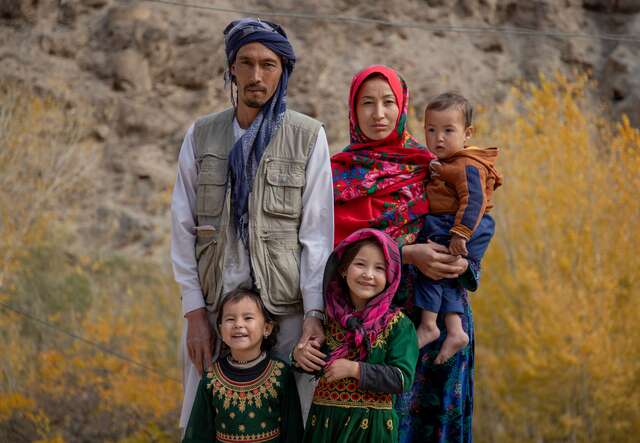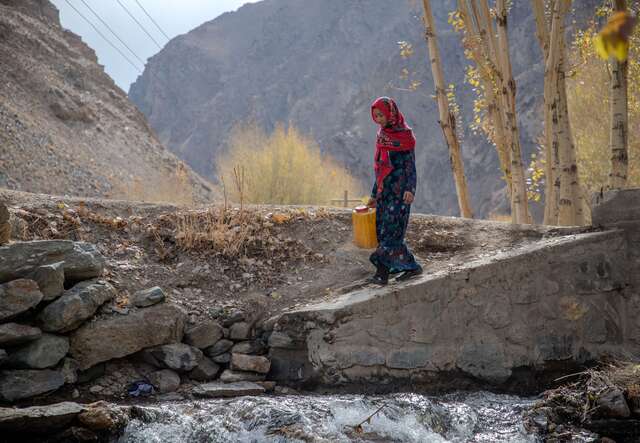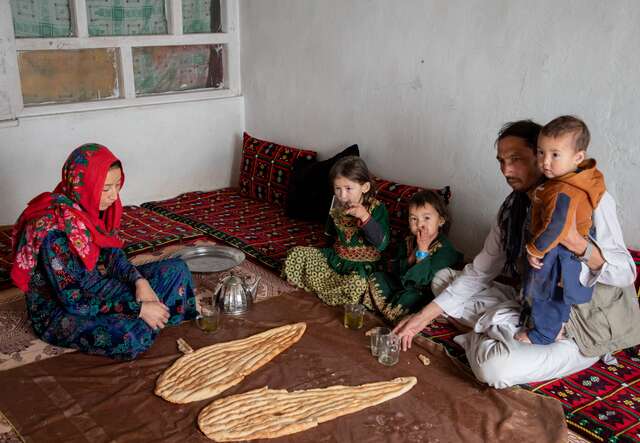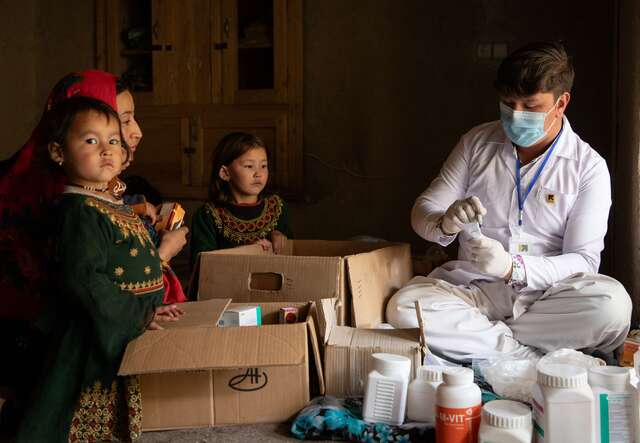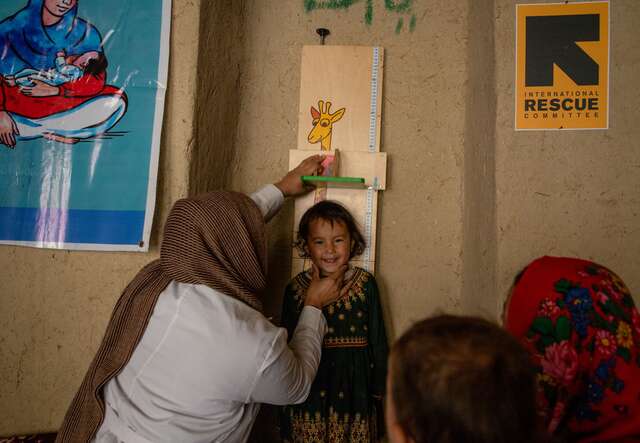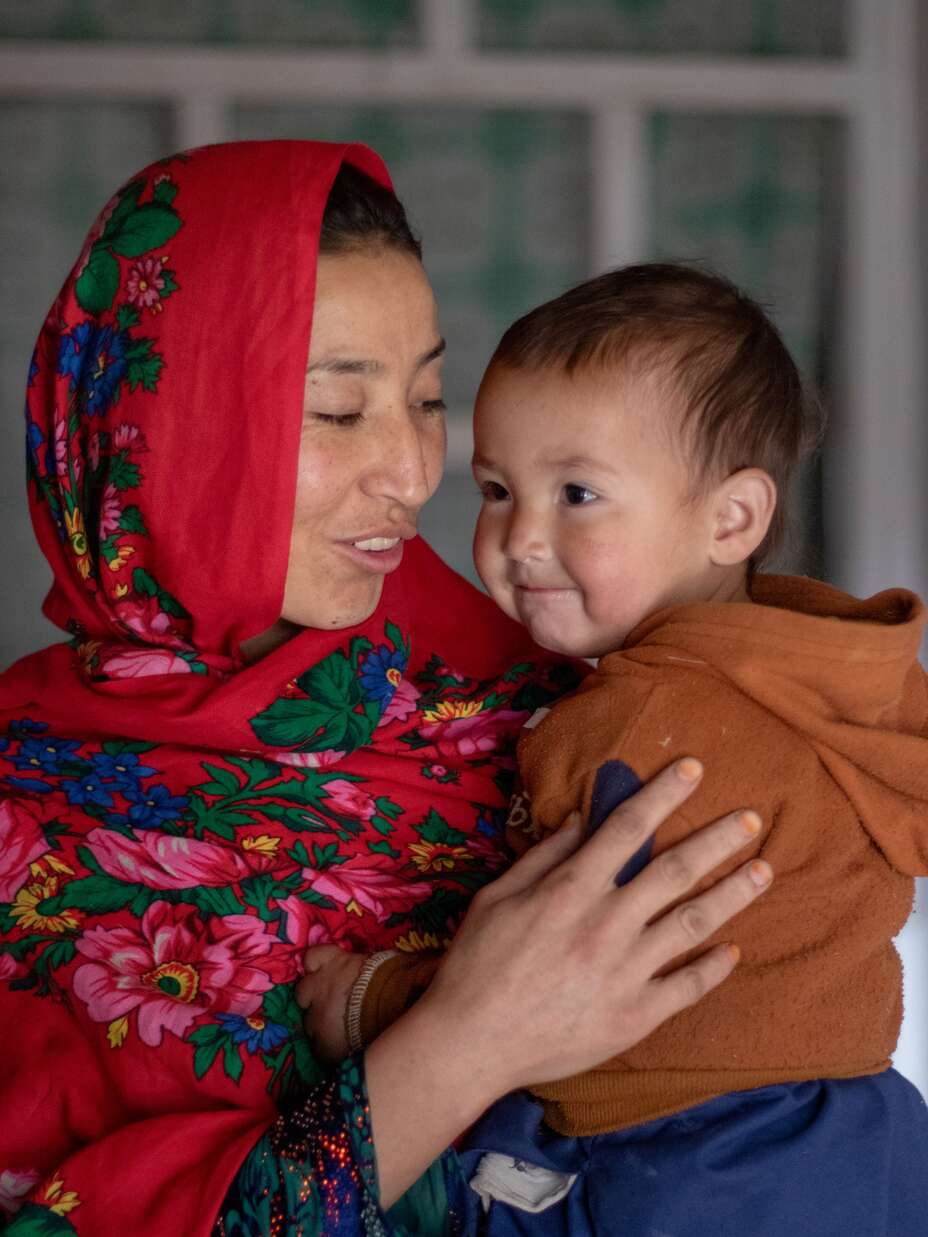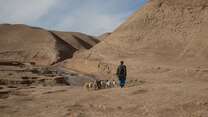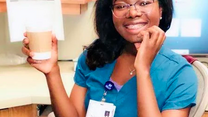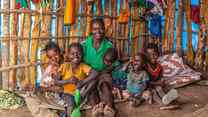Rozama is a 27 year old who lives with her husband, three children and in-laws in Sabzaab Bala Village, located in the Bamiyan province of Afghanistan. Her family subsists on the meager income her husband, Muhammad Younis, makes from potato farming. This means of livelihood has also been adversely affected due to the severity of the cold and the ravages of climate change on the agricultural sector. “We have no other way of income. My husband grows the potato, fertilises them. He sells the potato, receives the money and pays off the loan. Maybe some money is left for us. It is not that much income for us.”
Rozama outside her house in Sabzaab Bala village, Bamiyan province, Afghanistan, with her husband, Mohammad Younis, and three children; Fatima, Fahmia, and Amir Ali.
Photo: Abeera Atif for the IRC
Afghanistan - being extremely vulnerable to climate change - is currently experiencing a climate-emergency: after undergoing the most devastating drought in 30 years in 2021-2022, it is now in its third consecutive year of drought-like conditions. Some of the biggest hurdles are obtaining clean water for drinking and having enough water to irrigate their fields.
Because of the lack of drinking water, river water is used by residents of the village for both drinking and agricultural irrigation, which leads to many people falling sick.
“We don’t have access to clean water and that is why we use the river water,” Rozama tells us, “When we drink this unclean water, it absolutely causes the children to get sick. Once I got sick because I drank this unclean water.”
Rozama at the river in her village to collect water for her family.
Photo: Abeera Atif for the IRC
The harsh winter in the Bamiyan province brings with it freezing temperatures, leaving the entire population of the area at risk for contracting the flu or a cold. Most houses have inadequate means for heating - unable to afford coal, heaters, or even warm winter attire - putting children at a high risk for getting sick.
The small amount of wood Rozama’s husband collects for heating gets wet in the winter and they cannot afford enough coal to heat the whole house. She says:
“It is difficult to light a fire with wet wood, there will be smoke. Wet wood has its problems. On the other hand we cannot buy enough coal. It will be enough for two or three days because we make fire in several rooms. It will not be enough for a longer time.”
Rozama and her family sit in their home and have breakfast, which consists of fresh bread and green tea.
Photo: Abeera Atif for the IRC
The intensity of the cold is a huge hazard to those living in the Bamiyan province. Rozama worries for the health of her young children, unprotected against the bitter cold.
“If we need it then we borrow money and buy warm clothes for our children because we don’t want the children to get sick due to the cold,” she tells us.“If they get sick then it will be a bigger problem since we would have to take them to a hospital.”
The closest hospital to the village is in the Bamiyan centre and Rozama’s family cannot afford to travel there for medication and treatment.
Rozama with her children collecting their medication from IRC pharmacist Hussain Ali.
Photo: Mahab Azizi for the IRC
The people in a nearby village, Rozama tells us, have been complaining about their water shortage for 2 years. The situation proved dire when people started fighting over water: “They say that there is not enough water to irrigate their agricultural fields as some of the fields got dry. Some people clashed over the water. They were taken to the hospital because they got injured.” With an already precarious healthcare structure in these areas such incidents only further burden the system and deter people from receiving the medical attention they require.
The IRC mobile health clinic, running with funding from the EU, has been crucial in bringing immediate healthcare to Rozama and other families in the area.
“It is good that [the IRC] doctors come every month. They sometimes come earlier, before the month ends. They distribute medicine for us. Then we don’t not need to go to Bamiyan centre.”
IRC nutrition counselor, Faiza Irfani, checks the height of Rozama’s daughter, Fahmia, on the stadiometer.
Photo: Mahab Azizi for the IRC
As a mother Rozama finds it difficult to not be able to give her children what they need. But she perseveres forward with hope:
“When I can’t meet the demands of my children I still say, okay no problem. I will make some handicraft, then I will sell it, or do something else to find money and meet their demands.”
She wishes for a more prosperous future for her family and the rest of Afghanistan.
Rozama with her son Amir Ali. She says, “It is the hope of all mothers, not only mine, to see their children happy.”
Photo: Abeera Atif for the IRC
In her resolve for a better life, her message to the rest of the world is: “I request other countries to help Afghanistan. Afghanistan is a war-torn country. It is winter and the people are very poor. As some of the people don’t have food, some don’t have blankets. We hope these people get help.”
I request other countries to help Afghanistan. Afghanistan is a war-torn country. It is winter and the people are very poor. As some of the people don’t have food, some don’t have blankets. We hope these people get help.
About our work with the European Union

